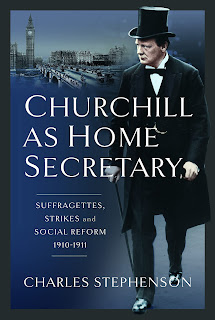Book - Churchill as Home Secretary
Published today by Pen & Sword History, Tony Cross read Churchill As Home Secretary: Suffragettes, Strikes and Social Reform, 1910-11 by Charles Stephenson...
“There can be few statesmen whose lives and careers have received as much investigation and literary attention as Winston Churchill.”
Another book about Winston Churchill. This one focuses purely on his short time as Home Secretary in Asquith’s Liberal government, which has been discussed in other books about Churchill but has not been the focus of a singular study. Or none that I can think of. And although his time as Home Secretary was short it coincided with a number of important and disturbing events, some of which have been used as sticks to beat Churchill’s reputation with since: Tonypandy being the classic example.
Churchill is, of course, a politician who attracts strong opinions. That is partly, as Robert Rhodes says, in a quote this book uses:
“The quandary of Winston Churchill may be simply expressed: There were so many Winston Churchills. This baffled his contemporaries and often inspired their mistrust; it has caused historians and his biographers comparable problems.”
One of the strengths of Stephenson’s book is that he tackles Churchill without fear or favour. He focuses on various in Churchill’s time at the Home Office: Tonypandy; the Suffragettes; Eugenics; Prison reform; the Death Penalty; the Security Services; the Sidney Street siege; the major strikes of 1911* and, finally, the discussions about Britain’s potential role in the event of a German invasion of France. The latter was to be the catalyst for his move from the Home Office to the Admiralty.
Stephenson discusses each of these issues in their own chapters and talks you through the events and Churchill’s role in them. He strengthens his discussions with a raft of contemporary sources: both primary and secondary. It is a sign, perhaps, of this book’s strength that it comes with copious notes and a full bibliography so that you can see, as maths teachers are fond of saying, his workings. The conclusion is nuanced.
As Churchill’s successor Reginald McKenna said in 1913:
“If you want to ruin a man send him to the Home Office.”
After all if there is a job in government where events can sweep over you and blame can be easily delivered into your lap, deserved or not, it is Home Secretary. The responsibilities are broad and the areas they cover are all important. It is easy to be swept away. It is clear, as Stephenson says, that Churchill didn’t enjoy his time as Home Secretary. He found it a difficult job with unpleasant responsibilities. This is illustrated by the explanation of how the systems built around the death penalty works for a Home Secretary, which was one of the most powerful parts of the book for me.
Churchill certainly wasn’t the monster as mythology has him to be when serving as Home Secretary, but equally he was prone to pushing his authority and getting bees in his bonnets on particular issues. The section on eugenics is a good example of the latter, but what does come across is that Churchill had a strong belief in what society should be and, as Stephenson says when talking about Churchill’s reaction to the suffragettes – and by extension working class protest in general:
“Churchill was profoundly irked by suffragette activities and Addison’s point about him and the working class – that whilst he ‘saw it as the duty of his class, and hence of the state, to protect the weak and the poor. The strong and rebellious were an altogether different matter.”
So, whilst this might be another book about Winston Churchill it is a worthy addition to the…genre? Its narrow focus really helps Stephenson get into the nitty-gritty of Churchill’s time at the Home Office. It deals with Churchill not as myth but as the reality, which is important with a historical figure who comes with so much baggage.
* Which sounds horribly like the present day both in cause and result.
Follow Tony on Twitter @Lokster71
Image - Amazon






Post a Comment